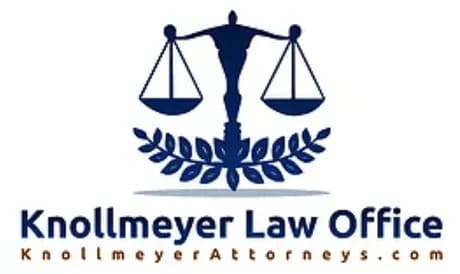Bankruptcy Attorneys in Jacksonville, AR
If you are an individual or business looking for bankruptcy lawyers in Arkansas, no doubt you are holding onto your money as tightly as possible. Experienced bankruptcy lawyers will understand and not charge extravagant fees for bankruptcy assistance. Without a qualified bankruptcy attorney, one small misstep can result in your case being dismissed.
Our experienced bankruptcy attorneys will provide:
- Expert bankruptcy preparation
- Petitions on your behalf
- Foreclosure defense
- Legal representation and protection
- Thorough planning to resolve your debt
When everything is said and done, you can be ahead financially and have peace of mind. A bankruptcy attorney will be able to determine if bankruptcy is right for you. At Knollmeyer Law Office, we explain the differences between bankruptcy types, explain the outcomes and decide which type is most advantageous for you or your business.
Chapter 7 Bankruptcy
Chapter 7 Bankruptcy sometimes is thought of as being associated with financial ruin or failure. There are actually a great number of benefits connected to it, especially when filing under the guidance of a Chapter 7 bankruptcy attorney.
When debt threatens to overwhelm you, the stress can take a toll on your well-being. Being unable to keep up with the mortgage payments, credit card bills, and other debt can leave you feeling like there’s no way out. If you’re dealing with a mountain of debt, or you’re worried about your family’s or business’s future, this process may help provide you with the fresh start you’re looking for.
A Chapter 7 lawyer of choice for Central Arkansas is the Knollmeyer Law Office. We work hard to help businesses and families navigate the legalities of Chapter 7 bankruptcy when they’re facing overwhelming financial demands. It’s our business to help you overcome the financial hardship that’s come upon you.
- Is Chapter 7 Bankruptcy the Right Option for Me?
Before filing for Chapter 7 bankruptcy, it’s important to learn if this option makes the most financial sense for you.
Working through a few critical questions can help you decide.
- Will enough debt be discharged to make this option worth your while?
- Will you be required to give up property you’d rather not part with?
- Are you legally protected from creditors? Meaning are they barred from taking your property
- or income whether or not you file for Chapter 7 bankruptcy?
- Are they any co-signors responsible for any of your debts?
Considering these questions carefully will help you get an idea if this is the direction you should take or if you should seek other alternatives for debt management. Whether to file bankruptcy or not is a complex decision and not one to be taken lightly. To gain a clearer understanding, contact a Chapter 7 attorney at Knollmeyer Law Office today at 501-860-6661. It’s a free consultation and worth the time you save by talking through this with an experienced professional.
- How does Chapter 7 Bankruptcy work?
The two most common types of bankruptcy that come to mind when people are in financial trouble are Chapter 13 & 7. The bankruptcy differences between 7 and 13 are large and it’s important to understand both to ensure you’re taking the best path for your financial future. You can learn more about Chapter 13 here.
Chapter 7 bankruptcy is the most common. It allows people who are filing to eliminate their debts and start over with a clean slate without having to make payments to a trustee for 3 to 5 years.
Chapter 7 bankruptcy is known as the liquidation bankruptcy. If there are any non-exempt assets, a bankruptcy trustee collects them and sells these assets. The trustee then distributes the net proceeds to the debtors outstanding debts. After the case is completed, the court will discharge the debtor from any further liability on most or all of the existing unsecured debts.
- What Property Qualifies as Exempt?
Exempt assets are retained by the person who files for bankruptcy. Property sold in a Chapter 7 bankruptcy is limited to non-exempt assets. In Arkansas, some of the most significant exemptions are:
- Homestead Property
- Personal Property
- Vehicles
In the state of Arkansas, debtors are allowed to use either the federal exemptions or Arkansas state exemptions, but not both.
To get a full understanding of exempted properties and financial limits, Knollmeyer Law Office is here to help you work through these complexities.
Give them a call today at 501-860-6661 to schedule a free consultation to learn more about Chapter 7 bankruptcy exemptions.
- What can you keep in Chapter 7?
The whole purpose of filing bankruptcy is to allow people the opportunity to get back on their feet again; it’s not to strip them of everything in their life and leave them empty-handed. In order to maintain a foundation, debtors are allowed to keep many or all things. For example, you can keep your:
- Primary Car
- Home
- Clothing
- Household Items
- Wages
- Pension/Retirement
While the area of exemptions can seem tricky, due to very specific requirements, rules, and terms, they also save you property and money during the process.
- Do I qualify for Chapter 7?
In order to file for Chapter 7 bankruptcy in Arkansas, you must be able to pass the Arkansas means test. This test is only applicable to higher income filers so if your income falls below the Arkansas median for your household size, you will be exempt from the test and are allowed to file a Chapter 7. If you exceed the Arkansas median, you’ll need to complete the means test to determine if you’ll have to pay back a portion of your unsecured debt via a Chapter 13 bankruptcy.
If you’re unsure where you fall in the scheme of qualified income, Knollmeyer Law Offices are available to help you work through the details of qualification. Call 501-860-6661 for a free consultation and we’ll help put your mind at ease.
Chapter 13 Bankruptcy
If you are considering filing bankruptcy, it’s important to understand the options available to you. For most individuals, this means you will either file bankruptcy under Chapter 7 or 13. There are some important bankruptcy differences between 7 and 13. You can learn more about Chapter 7 here.
Chapter 13 allows you to repay some or all your debts over time, rather than liquidating them. Many people choose Chapter 13 because they have income but want to stop creditors from demanding payment immediately. Chapter 13 allows you to make a single monthly bankruptcy 13 payment that covers all your debts. The amount of your payment is determined by your budget and the means test, which you and your attorney submit for approval by the court. Keep in mind that some debt like child support, alimony, student loans, and unpaid taxes cannot be discharged in any bankruptcy filing, but the payments on them can often be rescheduled in a Chapter 13.
- What Are the Advantages of Chapter 13 Bankruptcy?
If you meet the Chapter 13 bankruptcy qualifications, there are several advantages to reorganizing your finances in this way, including:
- Make payments you can afford over 3-5 years
- Discharge debts you do not pay in full
- Potentially save your home from foreclosure
- Remove a 2nd or higher mortgage
- Protect any co-signers from negative action
- Stop garnishments and levies
- Do You Own Property You Want to Keep?
A common reason people choose Chapter 13 bankruptcy over Chapter 7 is that it allows them to keep property that might otherwise be lost to creditors by repossessors, foreclosures, judgment, tax liens, etc. If you’ve been in financial trouble for a while, you may be concerned about foreclosure or repossession. Filing Chapter 13 initiates an automatic stay, stopping collection actions and giving you a chance to reorganize your debts.
- Depending on Your Income, You May Be Required to File Chapter 13
If you’re considering filing bankruptcy, it’s important to understand the bankruptcy differences between 7 and 13. Not everyone is qualified to file for Chapter 7 bankruptcy. If you live in Arkansas and your monthly household income is more than the Arkansas median, you might not be eligible to file a Chapter 7 bankruptcy.
- You May Have to File Chapter 13 Instead of 7 If Your Income is Higher
If your income is higher than the Arkansas median and you cannot quality through the means test either, your bankruptcy attorney will likely steer you toward Chapter 13 bankruptcy. Unlike Chapter 7, there is no maximum income to meet Chapter 13 bankruptcy requirements. The main limits for Chapter 13 are that your debt cannot exceed certain limits.
- The Impact on Your Credit Score Might Be Less Severe with Chapter 13 Bankruptcy
Filing for bankruptcy of any kind will have a negative impact on your credit rating. However, Chapter 13 may cause less damage than Chapter 7 and allow you to rebuild your credit faster. This is because Chapter 13 provides a greater opportunity for you to pay your debts as you are making your monthly bankruptcy 13 payments.
Another bankruptcy difference between 7 and 13 is that Chapter 13 bankruptcy will only remain on your credit report for 7 years, while a Chapter 7 bankruptcy case will appear for 10 years after filing.
- Chapter 13 Can Help You Repay Your Debt
Bankruptcy is a serious financial decision, but it might be the right choice if you are struggling with debt, especially if you have steady income and want a chance to reschedule payments on your home or car. If you’re considering it, an experienced bankruptcy attorney can help you weigh the pros and cons of filing for your specific situation.
BROWSE OUR WEBSITE
CONTACT INFORMATION
Phone: (501) 985-1760
Address: 2525 John Harden Drive Jacksonville, AR 72076



Licensed, Bonded & Insured
Arkansas State Bar
BUSINESS HOURS
- Mon - Fri
- -
- Sat - Sun
- Closed

